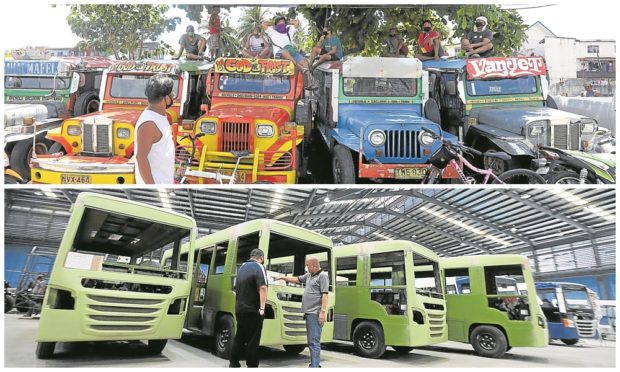
FILE – Members of the Airmen’s Jeepney Operators and Drivers Association sit idly on the roofs of their vehicles waiting to be allowed back on the road in Pasay City. Presidential spokesperson Harry Roque said the fate of the jeepneys would depend on whether new mini buses, dubbed “modern jeepneys” (lower photo), shown here at the Caloocan City warehouse of one manufacturer, Del Monte Motor Works Inc., were adequate to handle the commuter demand. —MARIANNE BERMUDEZ/GRIG C.MONTEGRANDE
MANILA, Philippines – The equity subsidies that the government gives to traditional jeepney operators who switched over to the modernized versions have doubled from P80,000 to P160,000, the Department of Transportation (DOTr) said.
DOTr and the Land Transportation Franchising Regulatory Board (LTFRB), which handles land-based public transportation franchises, said that the move was to help operators affected by the COVID-19 pandemic.
The agencies explained on Thursday that the move was made after Transportation Secretary Arthur Tugade amended a provision on the department order on the Public Utility Vehicle Modernization Program.
“In this time of pandemic, the Department of Transportation (DOTr) has approved to double the equity subsidy from PhP80,000 to PhP160,000 for operators joining the Public Utility Vehicle Modernization Program, with retroactive effectivity,” DOTr said.
“From PhP80,000, the Department will now grant PhP160,000 per PUV unit as equity subsidy for existing PUV operators with valid franchises and PUV operators applying for new or developmental routes under the Omnibus Franchising Guidelines,” they added.
According to Tugade, this is intended to help stakeholders taking part in modernization efforts even amid the pandemic, which will also be felt by operators who switched to the modern jeepneys earlier, due to the amendment’s retroactive effect.
He also thinks it will silence critics who have claimed that the department and the government as a whole have not done anything to help the transport sector, which has been sorely affected by the health crisis.
“Habang sumusulong tayo patungo sa pagbabago, ito ‘ho ang paraan namin para sabihing kaagapay ninyo kami sa Kagawaran ng Transportasyon. Contrary to the statements of other critics, we are here to assist and hear the concerns of all stakeholders,” Tugade said.
(As we move towards these changes, this is our way to tell you (drivers) that the Department of Transportation would help you. Contrary to the statements of other critics, we are here to assist and hear the concerns of all stakeholders.)
“Especially now that we are gearing to a future wherein modernization will greatly benefit everyone, kailangan ‘ho natin ito (we need this),” he added.
The government in March decided to place Metro Manila and the rest of Luzon under an enhanced community quarantine, suspending work except for essential frontline services.
The lockdowns also forced the suspension of public transport, which Ibon Foundation said have led jeepney drivers to miss out on P78,000 worth of possible income or P26,000 per month.
Recently, various personalities have called on the national government to either assist jeepney drivers who have lost their jobs or to let them operate again as quarantine restrictions are eased down.
Vice President Leni Robredo last Sunday hoped that the pandemic is not used to push for modernization as she called on officials to help poor drivers modernize instead of leaving them behind.
LTFRB chair Martin Delgra said that this would help other public vehicle drivers and operators to participate in the modernization program.
“More PUV operators and drivers can now participate in the PUV Modernization Program as they are assured of access to loans especially from government-run banks,” he said.
Modern jeepneys have resumed operations on Monday, as Delgra says that the traditional versions are least prioritized due to safety concerns over their seating arrangement, which they believe could contribute to local transmissions.
However, Ibon stressed that these fears are unfounded, especially as several studies believe that air-conditioning units contribute to the spread of the disease.